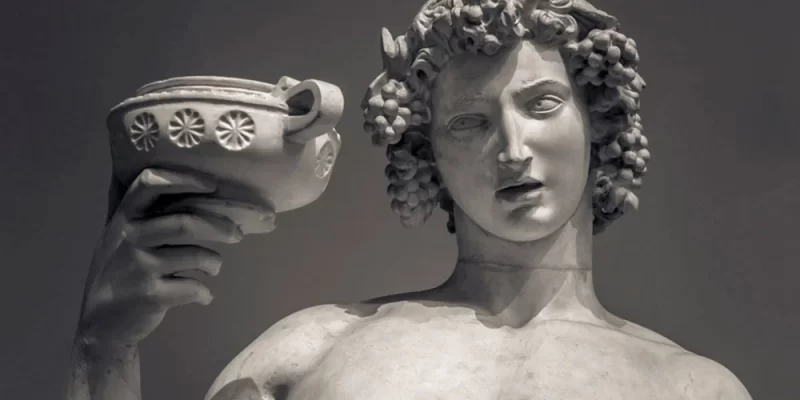DIONYSOS & HIS CULT:
Dionysus or Dionisos (Greek: Διώνυσος or Διόνυσος Dionysos; in some mythological works and especially in tragedies, he is also called Bromios, Euhios, Dithyrambos, Iakkhos, or Iobakkhos), also known as Bacchus (Bacchus) in Roman mythology. Challi is the god of wine. It represents not only the intoxicating nature of wine but also its social and beneficial effects. He is a supporter of civilization and a lover of peace.
Dionysus was born as the son of Zeus, the father of gods and all humans, and the mortal woman Semele. It is also important to note this. Although many articles or websites try to portray Dionysus as one of the Twelve Olympians, that is, the Dodekatheon, there is no uniform opinion regarding this in ancient sources. This is actually a claim made and made famous by Robert Graves in his book “Greek Myths” (1955). (The so-called Goddess Hestia gives way to Dionysus). However, even in a kind of Ancient Greek religious catechism called “On the Universe and the Gods” by Sallustius (4th century AD), Hestia’s name is still mentioned in the list. The birth myth is told as follows: Zeus fell in love with Semele, but his wife Hera was jealous of him. Hera disguises herself as an old woman and tells Semele to tell Zeus to show her his powers. While Zeus was showing off his power with all his brilliance, Semele burned and miscarried her seven-month-old baby. Meanwhile, Zeus miraculously saves Dionysus, who was protected from burning by a densely leafed ivy growing there, and hides him in his thigh. Later, God Dionysus is born from Zeus’ thigh. But this time, Hera bribes the Kuretas and gives the child toys to have fun with. A skillfully made mirror lures the child into a bush. On Hera’s command, the Titans kidnap Dionysus, cut him into small pieces and cook them in a cauldron. However, the boy’s grandmother, Rhea, takes pity on her grandson and, with Athena’s help, saves him and puts his pieces back together. After this, in order to hide Dionysus (twice-born) from Hera, the child is first dressed as a girl, and then sent to his sister Ino, the daughter of Semele, and her husband Athamas. But Hera, realizing this, drives Ino crazy, and while Ino kills her son by throwing him into a boiling water cauldron, she also shoots her husband, mistaking him for a deer. Zeus barely saves Dionysus from the hands of jealous Hera and turns him into a goat and sends him to the nymphs on Mount Nysa. Later, young Dionysus invented wine on Mount Nysa. Then, he begins to travel the world with his procession of nymphs and satyrs. According to Apollodoros, the God of Wine still could not recover from madness when he went to Egypt. Once in Phrygia, he is healed by Rhea and absolved of the sins of the crimes he committed during his period of madness, and is subsequently initiated into the Mysteries of his grandmother Rhea-Cybele. Then it passes to Thrace. King Lykorgas is an enemy of grapes and wine. He arrests Dionysus’ entire regiment. Dionysus himself can barely take shelter next to Thetis on the seabed. But holy revenge is not delayed and King Lykorgas goes mad. Mistaking it for a vine tree, he attacks his son and comes to himself after destroying his legs. Dionysus, God of Wine, passes to the Islands. The following legend is told about this journey: While Dionysus was on the shore of a rocky island, he was caught by pirates and wanted to be taken to Egypt or Cyprus to be sold as a slave. But every time they tied Dionysus, the ropes on him fell spontaneously, attracting the helmsman’s attention; Thinking that this young man might be a God, he warns his friends to release him. However, no one pays attention to the helmsman. Meanwhile, the whole ship sweats wine, and vine branches and bunches of grapes begin to cover the sails and masts. The captive young man jumps on the captain and turns into a roaring lion. Seeing this, the pirates jumped into the sea out of fear and turned into dolphins when they jumped. Only the helmsman survives this disaster. When he goes to the island of Naxos, he finds Ariadne, whom Theseus left behind. Apollodoros says that Dionysus took the beautiful Ariadne, daughter of Minos, to the island of Lemnos and had three or four children with her. Ariadne eventually receives the gift of immortality from Zeus and becomes the permanent wife of the god of Wine.

He lived in the Bekilli region of Denizli province. He is a god who goes against the Hellenic pantheon. All their legends are based on one motif: reaction and resistance. Like its symbol, the vine tree, it dies and is reborn, oscillating between pleasure and pain. Therefore, it represents a manic-depressive mood in psychiatry. Although he is generally mentioned as the son of Zeus and Semele, in some sources he is shown as the son of Zeus and Persephone or Zeus and Demeter. It is claimed that the cult of Dionysus also directly influenced the Christian religion. Dionysus is also known as the god of grape harvesting. The foundation of the theater was laid during the grape harvest festivals held in his name. There was a choir at these festivals; Later, one actor and then a second actor came in front of the chorus, thus laying the foundations of the theatre.

